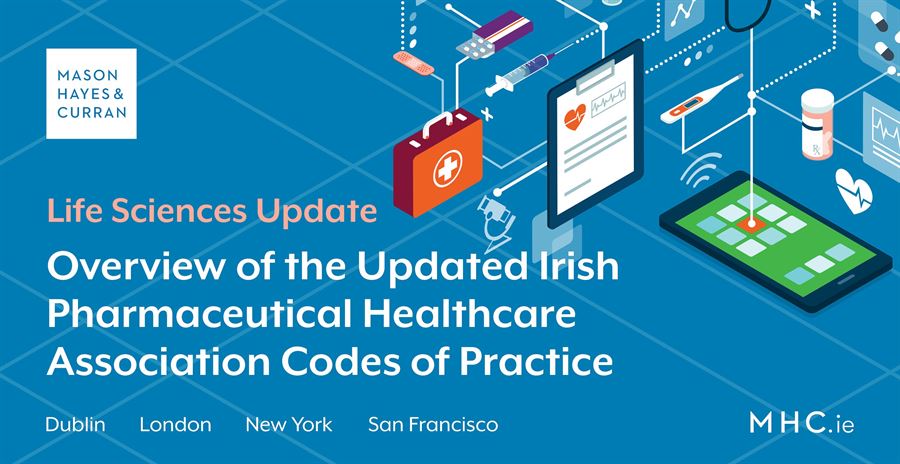Life Sciences Update: Overview of the Updated Irish Pharmaceutical Healthcare Association Codes of Practice

The Irish Pharmaceutical Healthcare Association (IPHA) has published updated versions of its Code of Practice for the Pharmaceutical Industry and the newly titled Self-Care Advertising Code, which will become effective on 1 March 2021.
Although stakeholders are encouraged to review the Codes in full, we highlight some key points to note to ensure optimal compliance.
Code of Practice for the Pharmaceutical Industry
-
Principles: the European Federation of Pharmaceutical Industries and Associations (EFPIA) Ethical Principles have now been incorporated.
-
Medical education: specific rules relating to medical education, defined as relating to human health and diseases and specific non-promotional training, are now included. These provide that relevant materials, activities and events must not constitute promotion and must be fair, balanced, objective, and designed to allow the expression of diverging theories and recognised opinions.
-
Public relations: A number of changes have been made on the content and approval of press releases. For example, press releases must be non-promotional in both content and purpose and adhere to various principles depending on the audience that they are addressed to, be it lay or medical media.
-
Publication of Findings: unless specifically requested by a respondent, the decisions of the Code Council/Appeals Board relating to a non-upheld complaint will not be added to the Publication of Findings which is published at least once a year by IPHA.
-
Patient Organisations (POs”) (Annex III): New requirements relating to funding of POs have been added. For example, written agreements setting out the details of financial support, significant indirect support and/or significant non-financial support to POs by IPHA member companies are now required. When supporting PO members to attend conferences, member companies must also have clearly defined processes for identifying the appropriate PO representative attendees.
-
Transfers of Value (ToVs) (Annex V): There are now additional requirements in relation to disclosures of TOVs. Disclosure must now be made by each company within the usual timeframes unless there is a valid legal reason not to do so, and the legal basis for disclosure has been revised to account for the processing of personal data in the case of HCPs and the need for 100% individual level disclosure (via contract) in the case of HCOs.
-
Advisory Boards (Annex VI): Detailed guidance has also now been added relating to the organisation and conduct of Advisory Boards. Advisory Boards are defined as a group of external experts assembled by companies to obtain professional guidance, advice, insights or other information to further legitimate scientific or business needs, on a specific topic for which the expertise and knowledge are not available within the company.
Self-Care Advertising Code
-
Traditional Herbal Medicinal Products (THMPs): the scope of the advertising rules has been expanded to include herbal medicines, as defined in the Medicinal Products (Control of Advertising) Regulations 2007. For example, advertising must make it clear that the product is a THMP and claims such as "clinically proven" or "effective in.." are not acceptable, as registration for traditional use is based on exclusively long-standing use. It has also been confirmed that food supplements and homeopathic medical products do not come within the remit of the Code.
-
Consumer Medical Devices (CMDs): non-prescription medical devices for self-care use are also expressly covered. Advertising for CMD’s must not include claims that go beyond the scope of CE certification, imply that the CMD is a medicine, ascribe functions to the CMD that it does not have, suggest off-label uses or fail to inform of likely risks associate with use in line with the intended purpose of the device.
-
Reputational damage: a clause prohibiting activities that would bring the industry into disrepute or undermine confidence in advertising, or prejudice public confidence in consumer healthcare products has been included.
-
Checklist: Annex II contains a detailed checklist for advertisements for consumer healthcare products, with a dedicated section for THMPs.
-
Online activities: a section on online activities, including guidance around websites directed towards young adults, website monitoring, website ownership and data protection requirements is also included. Importantly, the Self-Care Advertising Code also confirms that information placed on the internet outside Ireland by an Irish company or with the authority the company, that is directed to Irish consumers or makes reference to the availability or use of a consumer healthcare product in Ireland are subject to the IPHA online advertising rules.
Useful interpretive guidance sections are also interspersed throughout the Self-Care Advertising Code.
Application
Because the Medicinal Products (Control of Advertising) Regulations 2007 recognises these self-regulatory Codes, members as well as non-members of the IPHA should take note of these changes and ensure that they are compliant on or by 1 March 2021.
The Codes are available here.
Conclusion
Affected stakeholders should review the full content of the update Codes to ensure optimal compliance and to avoid any potential sanctions.
For expert guidance on these matters, contact a member of our Life Sciences or Product Regulatory & Consumer Law team.
The content of this article is provided for information purposes only and does not constitute legal or other advice.
Share this:




